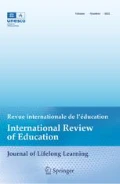Notes
The chapter is entitled “Developing professional learning and identity through the recognition of experiential learning at doctoral level” (pp. 8–25).
“The Portuguese case of RPL new practices and new adult educators: some tensions and ambivalences in the framework of new public policies” (pp. 26–42).
These are four perspectives of accreditation of prior learning (APL) which differ in terms of the purpose of the accreditation. In the procrustean model, which has the narrowest approach, accreditation aims to help the learner find a job, therefore only those elements of prior learning are accredited which are relevant to the labour market. Assessment is done by interviews and performance tests and the results are gathered in a portfolio. A somewhat extended version of this is the learning and development model, which is used in higher education. Here the portfolio is “developed” starting with any existing documents of prior learning, adding learner’s reflections on their relevant prior learning etc. The approach of the radical model is “learning for empowerment”. It uses participation in social movements as an indicator of prior learning, and the term “radical” denotes APL’s ultimate aim to effect radical social change. In the Trojan horse model (alluding to hidden or disguised powers), prior non-formal and informal learning is recognised towards admission to higher education courses.
“Recognition of prior learning: exploring the ‘knowledge question’” (pp. 43–59).
“The politics of recognition: critical discourse analysis of recent PLAR policies for immigrant professionals in Canada” (pp. 60–76).
“Love, rights and solidarity in the recognition of prior learning” (pp. 77–96).
“Converting RPL into academic capital: lessons from Australian universities” (pp. 97–113).
“Portfolios and meaning-making in the assessment of prior learning” (pp. 114–130).
“Agreements in assessment of prior learning related to higher education: an examination of interrater and intrarater reliability” (pp. 131–143).
“Translating validation of prior learning in practice” (pp. 144–166).
Author information
Authors and Affiliations
Corresponding author
Rights and permissions
About this article
Cite this article
Msiska, F.G.W. Recognition of prior learning: Research from around the globe. Int Rev Educ 63, 133–136 (2017). https://doi.org/10.1007/s11159-016-9590-5
Published:
Issue Date:
DOI: https://doi.org/10.1007/s11159-016-9590-5

